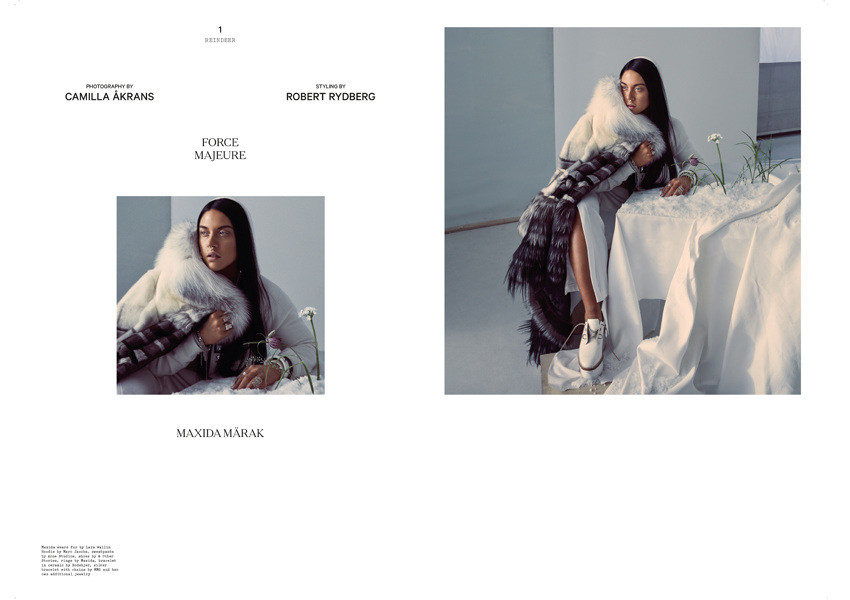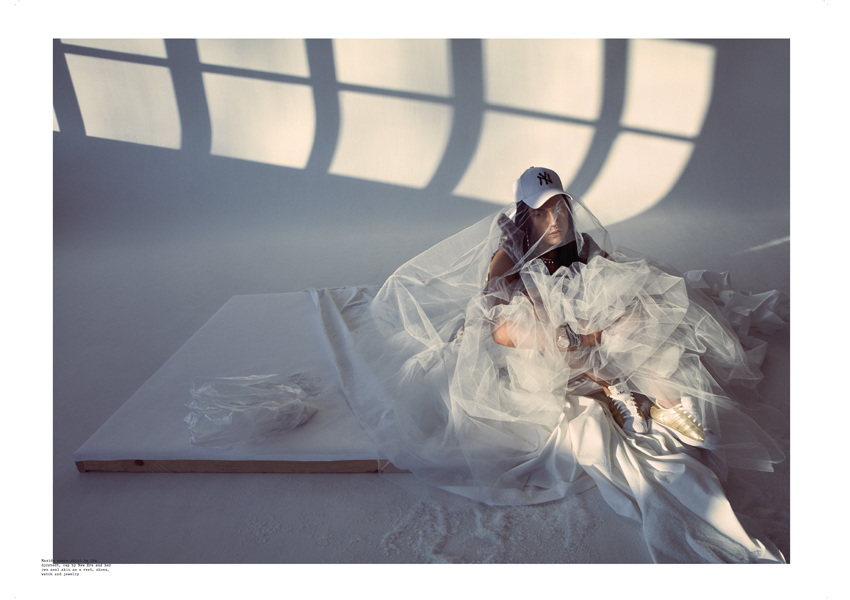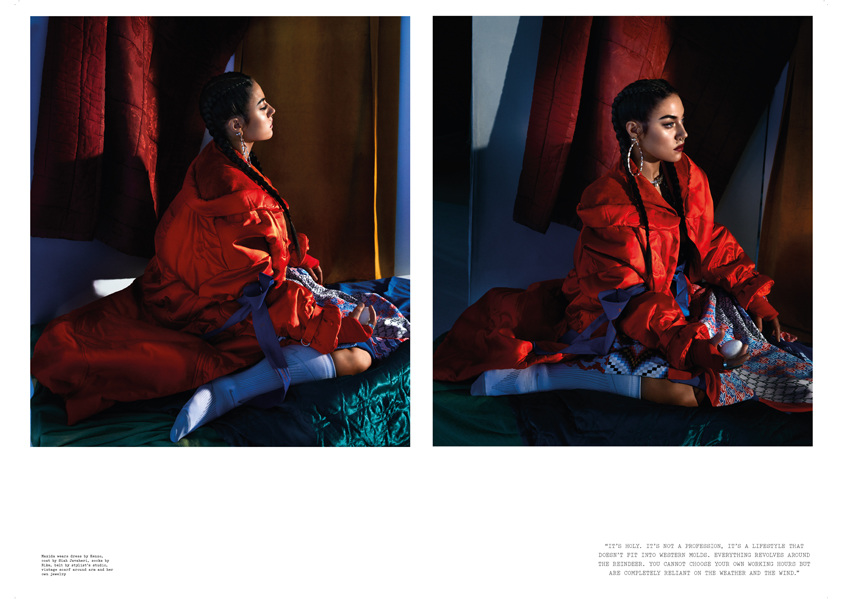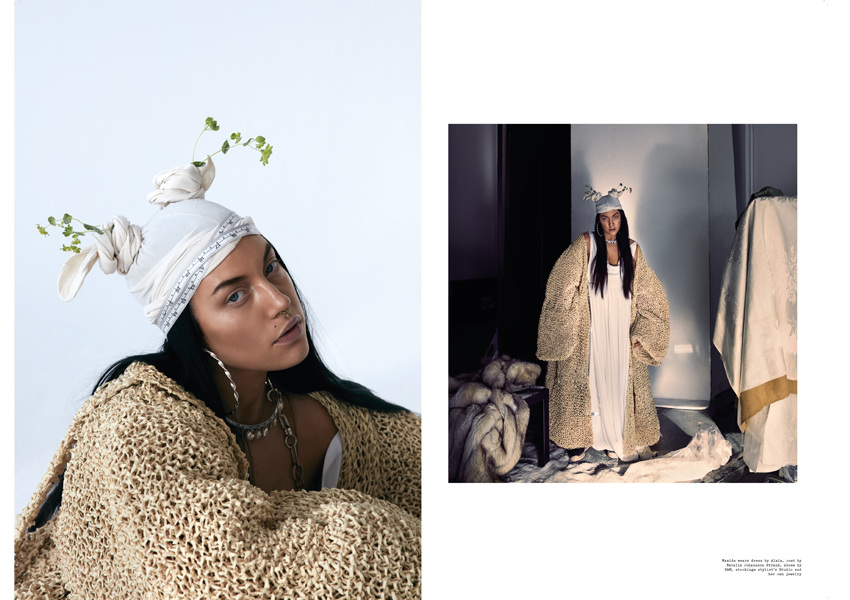 Everything from Reindeer and Mountains to Baseball bats
Everything from Reindeer and Mountains to Baseball bats
Music is an effective political weapon. Maxida Märak is a hip-hop musician who has become a leading figure in the resistance to the growing mining industry in Sápmi, the northern mountainous region of Sweden.
By Antonia Nessen
Photography by Camilla Åkrans and fashion by Robert Rydberg
When we meet, Maxida has taken a break from touring. She is taking part in a play at the Royal Dramatic Theater that she has co-written, has been involved in several TV series, and will soon release an EP. And she has recently done a TV thing in which they didn’t want her to wear her cap. She is used to people wanting to come along and peel off some of the layers of her street style and take away what makes her unique in order to make her conform to a gala-glam style for the stage.
“But for me gala-glam might be a phat tee for example, that’s how I want it. And I have to have the cap, it’s my cap! Otherwise I wouldn’t have worn it in the first place.”
When Maxida was pregnant with her now 4-year-old daughter she decided to work with music full time.
“I sit on the sofa or at the kitchen table and jam. I can get an idea on a bus or otherwise I just sit down and write. So it comes to me quite easily even though I sometimes get stuck when life gets in the way.”
Maxida is just as much a writer as a musician. She thinks it’s important that one can read the texts on their own and take them in without the need of heavy beats. Maxida has joiked since she was a child and has always made music, despite focusing on theater for a long time.
“Among all nomadic peoples, oral narrative culture has been the most important way of passing on traditions and such, as we have not had a written language. The joik is part of this culture since it is more than just a way of singing. One doesn’t say that one joiks about something but simply that one joiks something. The joik is more like a feeling converted into music,” says Maxida.
“When I was young my favorite joik was when my grandfather joiked a love joik about an old flame of his. Then there is also the train joik that just illustrates how someone imagined a train. There are joiks about all kinds of things. I have a song that is called Baseball Bat, for example, because I wanted to kill my sister’s abusive ex. And there is really nothing but pure rage in it – so it’s about everything from reindeer and mountains, to baseball bats.”

When Maxida worked at the Sami theater in Kiruna she started writing songs protesting against the growing mining industry in Sápmi, the Sami community that straddles Sweden, Norway, and Finland, as well as the Kola Peninsula, and that has been inhabited by the indigenous people since prehistoric times. Sápmi includes the World Heritage Site Laponia, which is one of the best-preserved examples of a nomad area in northern Scandinavia, with its cultural relics, unique natural phenomena, untouched ancient forests, mountain ranges, and glaciers.
“For quite some time I was the only one making a loud noise about this,” says Maxida, who grew accustomed to being a target of hatred as soon as she opened her mouth.
Did people want to shut you up?
“Definitely. I have no problem with discussing the mining industry with someone who is in favor of it. I have nothing against miners, it’s the industry that’s dirty. There is a big difference between someone who has well-founded arguments to discuss and someone who calls one a ‘dirty Lapp’ or a ‘diva’ or says, ‘Look at what she’s wearing,’ or, ‘Who the hell does she think she is?’ That’s not criticism, that’s bullying.”
What is the situation like at the moment?
“I still generate a lot of controversy, am hated and loved and talked about in Norrbotten. But now that I’m well-known it’s a bit more popular to be on my side. Nowadays I really feel that I have enormous support among people who I don’t even know. Not just when it comes to the mining issue but also the rights of Samis in general, not just in Norrbotten but in all of Sweden. That’s made things a lot easier.”
How do you handle the resistance?
“I have to be fearless and cover my back because I think that what I say is the truth. I will never give in and now that I have acquired something of a leadership position in Sàpmi when it comes to these issues, it means that it’s up to me to keep my word, not be a turncoat, speak out every time – that’s the only way to make people realize that, ‘Yes, it works. It’s possible.’”
Where does your interest and activism come from?
“When I first heard about the mining plans in Kallak everyone was so incredibly positive. People thought it was fantastic that Jokkmokk would finally get this. The jobs were well paid, people didn’t need extra training and they saw it as a shortcut to success – people were reaching for the dream of that life. Luckily many people have changed their minds. By 2011, two camps had formed.
Why did they change their minds?
“Because they suddenly realized the size of the area that was under discussion. It’s not like building a new IKEA, but more like flattening the entire municipality and building new roads and railroads, while other operations in the tourism and reindeer industries collapse.”
What Maxida is referring to is that while the mining industry creates jobs, other organizations will disappear within industries such as tourism, agriculture, and forestry – for the foreseeable future. To a certain extent mining is an irrevocable interference in nature and the cost for the future environmental remediation will not be borne by the mining companies once they have left. Estimates put forward by Hans Lööf, professor in economics at KTH Royal Institute of Technology in Stockholm, show that 99 percent of the mineral value would go to the mining company while the rest, only 1 percent, would benefit the local community. Sweden is almost giving away the mineral resources, in other words. Sweden – one of the EU’s leading mining nations with its long history of ore extraction and metal production – is ranked internationally as the best mining nation in the world for mining companies to establish themselves, due to favorable conditions and tax benefits (Namibia comes in second place).
“I remember my first encounter with the mining company very well. We were out checking the reindeer pastures before the winter when I walked straight into a machine that was busy digging. I asked what they were doing digging up the winter pastures of the reindeer. And I thought, shit, this is for real! As it turns out they didn’t even have permission to dig in all the places they were digging in.”

What would you recommend for people to do who find themselves in that position?
“It is inculcated in us that we have zero power. But I think one should take the law into one’s own hands, one should dare to do drastic things and attract the attention of those who are not politically informed. I don’t mean you should go along and shoot someone, but do things like what we did with Cahppes Raide, and when we stopped politicians and literally cornered them.”
Maxida’s struggle against the mine in Kallak gained impetus in earnest in 2014 when she collaborated in organizing the performance Cahppes Raide, a funeral procession during Jokkmokk’s winter market, which attracts tens of thousands of people every year to experience Sàpmi. The group blackened some reindeer and painted their own faces white, made traditional Sami attire – kolts – from trash bags and put coal and reindeer bones in the open sleighs – ackjas – creating the dystopia that awaits if Sweden continues with its mineral strategy that puts increasing pressure on Sami land.
“It’s very good that a lot has happened in the media recently, also when it comes to the rights of the Samis. I am proud to have been part of that movement. It’s important to highlight what has happened. The scars still remain. I don’t think people really understand the extent of the violations against the Sami people, well into the twentieth century.
Are you hopeful when you think of the future?
“Yes, my generation has been confronted with more issues than we have had in very many years. It’s not so long ago that we were nomads and it takes a while for an oppressed people to attain any sort of position of power. But I have a lot of educated friends; because that’s the trick, to place ourselves in those positions of influence. And I put a lot of hope in ILO 169, which Sweden helped develop but refuses to sign.”
One of the things that Swedish Samis are fighting for is for Swedish politicians to follow the lead of neighboring Norway and ratify the International Labor Organization’s C169, the Indigenous and Tribal Peoples Convention, in order to start a process of uncovering the historical abuses committed by the state against the Sami people. Sweden has been criticized by the UN Human Rights Council and the EU Commissioner for Human Rights, amongst others, for not ratifying ILO 169.
“What kind of damned hypocrites stand around talking about human rights and justice when they can’t even sign that convention? It becomes so obvious that it’s all about lobbying, money, and power. If Sweden were to sign such a convention, the mining industry couldn’t bulldoze people as easily anymore.”
There are several ongoing conflicts between the Samis and the state regarding the restriction of Sami hunting and fishing grounds. You have reindeer herders in your family. What is your relationship to reindeer husbandry?
“It’s holy. It’s not a profession, it’s a lifestyle that doesn’t fit into Western molds. Everything revolves around the reindeer. You cannot choose your own working hours but are completely reliant on the weather and the wind. So it’s about living with animals and nature and takes up all of one’s time.”
Is it correct that you are a trained craftsman and have worked as a silversmith?
“I’ve worked a lot with silver jewelry, and knives were something of a specialty – it sounds like I’m a hundred years old! [laughs] But yes, I come from a culture where one decorates everything. You can go back four hundred years and look at knives that are extremely ornate, and see how much time they invested in decorating the sheathes with a variety of patterns using small holes and silver details.
Tell me about the kolt.
“There are still just as many rules about the kolt as there were four hundred years ago. We Sami don’t all have the same kolt, but depending on which area you come from your kolt has a certain appearance. I belong to the Luleå Samis, for example. As a woman you can never have predominantly white, green or yellow in your shoelaces but have to have red and blue. There really are many rules and detailed codes regarding what it should look like and it’s so amazing that they live on. I can look at someone’s costume and know which area, which language and which family the kolt belongs to. This is a very powerful aspect of our culture that’s important to preserve.
You live in Stockholm now. Will you return to Jokkmokk?
“I love the mountains, and always will, and hopefully I will have a home in both places in the future. At the moment it suits me to live in Stockholm because there’s so much going on here that you don’t have time to focus on your neighbor. But of course I will always love my village and Padjelanta and the surrounds but I think it’s extremely difficult to live in a community where people pretend to not see one another and not know. That’s dangerous.”
“We have to rid ourselves of the Scandinavian Law of Jante, which discourages individual success in favor of the collective, because it devastates people. Hopefully it will change with the new generation getting a bit of fresh input, because it’s easier to gain access to the world outside. Times are changing with the Internet and they can see things beyond their own village. And you can do what the hell you want because it’s nobody else’s business.”
Where does your pronounced sense of justice come from?
“I’ve been asked that many times. The answer is, I don’t know. When I was growing up I lacked a role model, a leader that didn’t give in. I was shocked time and again when I heard people speak of important things but not dare to say anything when they were in a political context. What are you so afraid of? We live in a country with freedom of speech and to not make use of it is like pissing on what we have. I would never ever back down just because I’m in a supposedly superior context. Because, as I said, I cover my back and I stand up for what I think and believe.”

